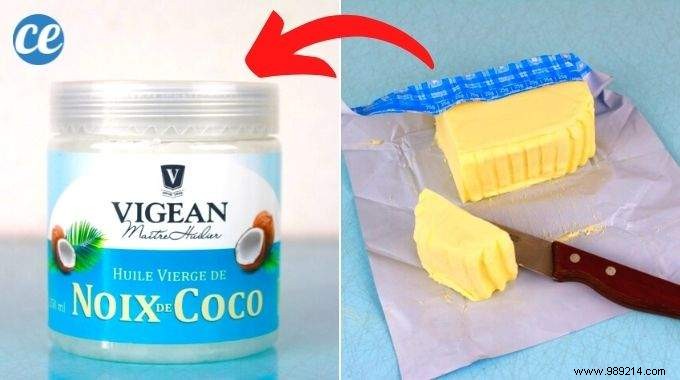
Here I show you how to use coconut oil in cooking to prepare your delicious meals.
Because you may not know it, but this natural vegetable substance is a great alternative to conventional fats.
It is full of benefits and its taste is most pleasant.
In any case, I changed my culinary habits by adopting coconut oil and I don't regret it.
But be careful, you shouldn't take just any!
Coconut oil is extra if it is virgin, cold extracted and not mixed with chemicals.
Did I make your mouth water?
So, discover now 10 uses of coconut oil in the kitchen that will change your life. Watch:
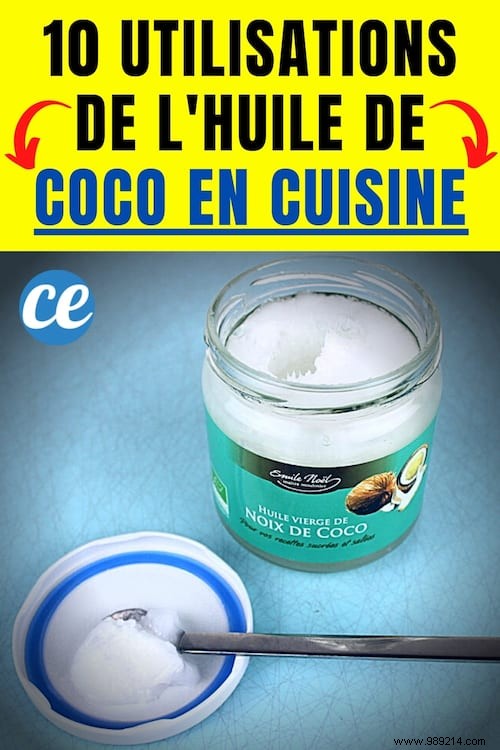
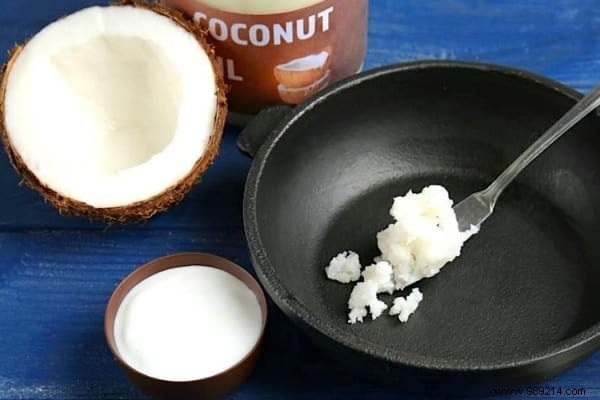
The advantage with coconut oil is that it has a high smoke point.
As a reminder, the smoke point is the temperature from which the oil emits continuous smoke.
And with coconut oil, you can go up to 177°C no problem.
A pure and unrefined oil can therefore be used in your pan-fried vegetables and other foods without any problem.
In addition, it gives them a nice exotic taste that changes from traditional cuisine.
If, however, the slightly more pronounced taste of coconut oil puts you off, you can use deodorized coconut oil.
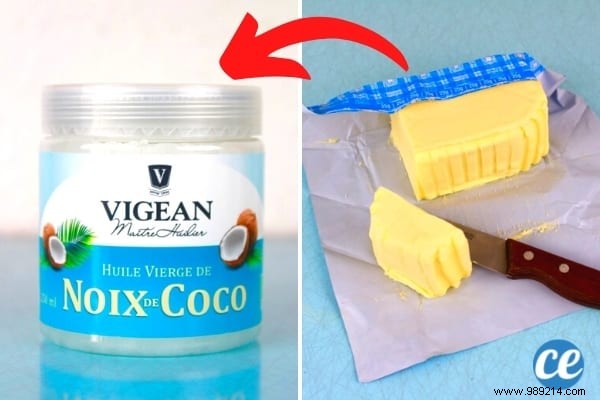
Did you know that coconut oil can easily replace butter in many preparations?
Chocolate cake, cookie, cake of all kinds...
Coconut oil is a perfectly healthy alternative.
Above all, it allows people who are lactose intolerant to be able to do without butter.
For example, I always use coconut oil to make my brownies.
Try it, let me know! Because the chocolate-coconut mixture is always a success.
On the other hand, for a savory cake, I rather use the neutral version of this oil.
I think it goes together much better.
And then, to top it off, the coconut oil melts faster.
A godsend for budding pastry chefs in a hurry.
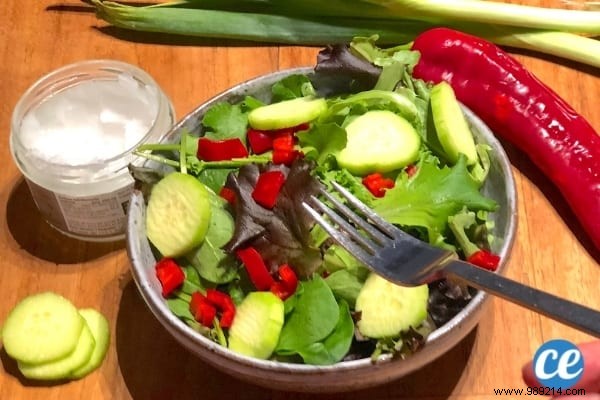
Do you usually make your vinaigrettes with olive, walnut or hazelnut oil?
It's true that these oils give a very original taste to our salads.
Well I have even better to offer you:a vinaigrette made with coconut oil.
Combined with wine or balsamic vinegar, this oil gives a little exotic taste that changes everything.
And since we are talking about exoticism, have you tried to associate coconut oil...
...with mango vinegar or exotic fruit pulp?
This culinary marriage works miracles on the palate.
For my part, I add a few pomegranate seeds and my guests are delighted.

Add oil to her smoothie; what idea are you going to tell me!
And yet, I assure you that this little touch makes all the difference in taste.
Coconut oil being natural and good for your health, no problem with it being part of your recipe.
Just limit yourself to only 1 tablespoon per smoothie , because the oil is still quite caloric.
In any case, that's what I do in my Green smoothie or exotic smoothie (mangoes or papayas).
The addition of a spoonful of coconut oil is a delight.
For more classic recipes, coconut oil is also quite suitable.
I'll give you an example.
Cut bananas into slices, add 10 cl of yoghurt, ice cubes and the famous spoonful of coconut oil.
Blend as usual in a blender until smooth and smooth.
Give your guests a taste and let them react...

A chocolate cake or a dessert, it is necessarily accompanied by a good topping or icing.
But even for experienced pastry chefs it is not so easy to do.
So to make the recipe easier, nothing better than using coconut oil.
Pour 6 cl of liquid coconut oil and 200 g of chocolate cut into pieces in a small saucepan.
Add 6 tablespoons of agave syrup and melt the mixture in a bain-marie.
Once the mixture is well runny, pour it all over your cold cake.
The recipe can be used as much in traditional mirror glaze as in topping.
My little personal touch:I add a few coconut shavings for a very refined black and white contrast.

Like most people, you probably use regular vegetable oil for your frying.
Well, know that coconut oil perfectly replaces conventional frying oils.
You can use it to fry your potato or sweet potato fries.
But also for savory, sweet donuts or even the famous tempuras.
For this last dish, I prepare things like this:
First, I make my tempura batter with 50g of flour and 25g of cornstarch.
Potato starch may also work.
To which I add 10 cl of water and 1 egg yolk then I mix.
I then bathe the prawns or vegetables (asparagus, peppers, etc.) in the preparation.
All you have to do is fry them in a hot pan filled with coconut oil.

Shake up traditions and change the recipe for mayonnaise!
And yes, this traditional sauce can very well incorporate a few variations.
You got it, it's about replacing classic oil with our coconut oil.
The only thing to respect when using coconut oil, is that it is liquid.
To do this, simply put the pot of oil in a bain-marie so that it melts.
Otherwise, the rest of the preparation does not change.
Very gradually pour the coconut oil over the eggs, mustard and vinegar while beating your mixture.
Personally, I put mango vinegar and turmeric mustard.
As long as to make mayonnaise exotic, let's go to the end of our culinary desires!

Your favorite breakfast is made with rusk and butter?
I have a nice alternative for you:replace the traditional butter with coconut butter.
And yes, it exists and it is sold more and more in organic stores.
In fact, coconut butter is nothing more than cooled coconut oil that becomes solid.
So get into the habit of putting your coco jars in the fridge to get the same result.
The hardened substance perfectly accompanies the drizzle of jam or honey.

Coconut oil is called a Vegan-friendly substance.
Due to its vegetable composition, it fully replaces animal fats.
For Vegans, it's gold in the bar.
They are always very surprised that I manage to prepare dishes adapted to their diet.
If I told them my only secret is simply coconut oil...
Here, I give you my fruit tartlet recipe, special Vegan friend.
I mix 200 g of flour with 8 cl of water to make my dough.
I add 2 teaspoons of coconut oil and 2 teaspoons of liquid vanilla flavoring.
I continue my recipe in the classic way, I spread my dough in the mold and I add the fresh fruit.
Let it cook for 15 minutes and it's ready.
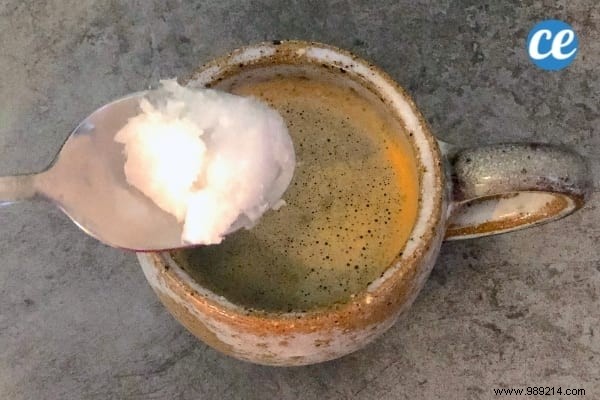
Café-gras or bulletproof in English, does that speak to you?
These somewhat technical names actually hide a very simple recipe.
That of adding a teaspoon of coconut oil to your coffee.
Beyond the taste, it is the health virtues that are sought with this variant.
Coconut oil is said to boost metabolism without pushing blood sugar levels too high.
A considerable advantage over sugar.
By the way, for this type of coffee, do not add sugar in addition to the coconut oil!
You should also know that fatty coffee is an excellent appetite suppressant.
It provides a fairly powerful satiety effect.
Now that you know how to use coconut oil, let's go into a little more detail about this substance.
The coconut grows in Asia, Africa, Central America and the Pacific Islands.
1 single coconut tree can produce between 50 and 150 fruits per year, fruit that will take almost 1 year to mature.
The oil comes from the flesh of the coconut.
This flesh, cold extracted and finely crushed, itself provides coconut milk.
This milk is left to settle for 24 hours until the cream, water and oil separate.
This is how the precious coconut oil packaged for sale to the general public is obtained.
Please note, virgin coconut oil should not be confused with copra oil.
Coconut oil is made from the dried flesh of the nut.
Its refining process is totally different from virgin coconut oil.
This process causes it to lose most of its nutrients.
It is mainly used in the food industry to make frying oils, confectionery...
To choose the right coconut oil, it must be marked on the packaging as "virgin" with "first cold pressing".
The organic brands like this one that I use generally include these 2 notions.
This makes it possible to be certain that the nutritional qualities are fully preserved.
Obviously, the carbon footprint of coconut oil is important for us Europeans, because the product comes from afar.
So prefer to buy it in the "eco-responsible" sectors and please, buy the oil in the glass jars.
It's frankly better than plastic packaging...
Ah yes, do not panic if the consistency of coconut oil resembles butter.
At room or low temperature, coconut oil is almost solid; but this is not an anomaly.
Just put it in a bain-marie or under hot water for a few minutes so that it becomes liquid.
Coconut oil hasn't always been popular.
Paradoxically, he was criticized for a lot of things which are in fact his main assets!
Today, everyone agrees that this oil has many benefits
First of all, coconut oil is loaded with saturated fatty acids, including those with medium chains.
And that is very good for cardiovascular balance and to prevent arteriosclerosis.
The body immediately consumes this type of fat which prevents any storage in our arteries.
These fats are therefore perfectly assimilated by our body.
Then it is also full of vitamin E (antioxidant) and lauric acid (48% content).
This gives it antibacterial, antimicrobial, antivirus and immunoprotective properties.
It is even credited with virtues against the Azheimer! Let's get along though.
There is no study formally confirming its usefulness against this disease.
But I still invite you to read the story of Mary Newport.
She confirms that coconut oil has indeed stabilized her husband's condition.
One of the main benefits of coconut oil is that it does not break down during cooking.
Even at very high temperatures, the benefits contained in coconut oil do not deteriorate.
With it, your frying oil stays good much longer and does not become toxic!
Cooking your food with coconut oil is even better than cooking it with olive oil.
Above all, it is digested very well; and it's perfect for people on a ketogenic diet.
Ingesting coconut oil does not call into question the requirement of this type of diet based on self-sufficiency.
Coconut oil is credited with slimming effects!
Indeed, this oil has the ability to increase the activity of cells during the digestion of food.
In other words, this oil allows what is called thermogenesis (energy expenditure).
It burns more calories than any other source of fat!
Well, be careful though; almost no studies have really validated this yet.
It is officially validated that coconut oil increases the caloric expenditure of the body, that's for sure.
But this effect is only temporary.
The body gradually gets used to this and the weight loss effect then fades.
At a minimum, however, we can consider coconut oil as a slimming ally.
Coconut oil isn't just for cooking.
It is also known for its benefits as a cosmetic product.
It serves as a moisturizer, make-up remover (even for waterproof mascara!)...
...But also care for hair and nails.
Coconut oil, consumed in reasonable quantities (1 to 3 tablespoons per day), does not produce any danger.
Especially if the oil is consumed virgin and does not contain preservatives.
And then no worries for people allergic to nuts.
Even though it's called "coconut oil", it doesn't contain any traces of tree nuts.
The advantage with the coconut is that it does not need fertilizers and pesticides to grow.
So in terms of the culture itself, we're pretty quiet.
It is only treated with an antibiotic to fight its main disease called lethal yellowing.
And again, only cultures in Florida use this type of treatment.
If this oil is "corrupted", it would be mainly because of its mode of extraction.
That's why we recommend a cold-extracted oil that keeps the fats of good quality.
We are therefore very far from having a product that is harmful and perverted by chemicals like palm oil.
Organic products are nevertheless to be preferred, as they come from sustainable ecological channels.
When you know that coconut has a high carbon footprint (because it's imported from the islands), that's an added bonus.
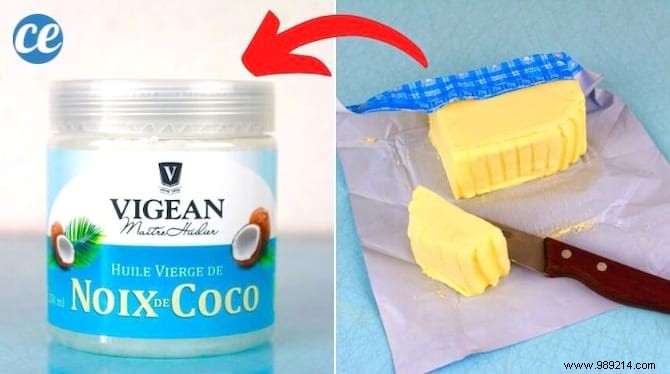
There you go, now you know all the uses and characteristics of coconut oil.
You especially now know why this oil is good to eat and cook.
In addition, it is easily found in all shops.
Carrefour, Leclerc, Intermarché, Auchan, Biocoop... Coconut oil fits perfectly into your daily culinary life!